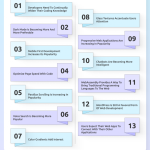Mastering Code Writing Techniques: Unlock Your Programming Potential Now!
Code Writing Techniques: Boost Your Programming Skills
Greetings, Readers! Today, we will delve into the world of code writing techniques. Whether you are a seasoned programmer or just starting out, these techniques will help you enhance your programming skills and improve your code quality. In this article, we will explore the what, who, when, where, why, and how of code writing techniques, along with their advantages, disadvantages, and frequently asked questions. So, let’s dive in and discover the secrets of efficient code writing!
What are Code Writing Techniques?
1 Picture Gallery: Mastering Code Writing Techniques: Unlock Your Programming Potential Now!

Code writing techniques refer to a set of practices and strategies that programmers use to write efficient, readable, and maintainable code. These techniques encompass various aspects of coding, including planning, organization, documentation, and optimization. By applying these techniques, programmers can write code that is easier to understand, debug, and modify, leading to improved productivity and reduced bugs.
Planning
Effective planning is crucial in code writing. It involves understanding the requirements, identifying potential challenges, and creating a roadmap for the development process. This includes breaking down complex tasks into smaller, manageable chunks, setting realistic deadlines, and allocating resources effectively. Planning helps programmers stay organized and ensures that the code meets the desired objectives.
Organization

Image Source: media-amazon.com
Organizing your code is essential for readability and maintainability. This involves using meaningful variable and function names, organizing code into logical sections, and following a consistent code structure. By adhering to a standardized organization approach, programmers can easily navigate through the codebase, understand the flow, and make modifications without introducing errors.
Documentation
Documenting your code is crucial for collaboration and future reference. It involves adding comments, writing clear function and class descriptions, and providing usage examples. Good documentation helps other programmers understand your code more easily and accelerates the development process. Additionally, documenting your code ensures that future modifications or bug fixes can be made with minimal effort.
Optimization
Optimizing your code is essential for improving its performance and efficiency. This includes identifying and eliminating bottlenecks, using efficient algorithms and data structures, and reducing redundant code. By optimizing your code, you can enhance its execution speed, reduce memory usage, and minimize the chances of runtime errors. Optimization plays a crucial role, especially in resource-intensive applications or large-scale systems.
Who Can Benefit from Code Writing Techniques?
Code writing techniques can benefit programmers of all levels, from beginners to experienced professionals. Whether you are developing a simple application or working on a complex software project, applying these techniques can significantly enhance your coding skills. Novice programmers can learn best practices from the start, while experienced programmers can refine their existing code and adopt new techniques to stay up-to-date with industry standards.
When Should You Use Code Writing Techniques?
Code writing techniques should be used throughout the entire development process, from the initial planning stage to the final deployment. By incorporating these techniques from the early stages, you can establish a solid foundation for your codebase and ensure that it remains scalable, maintainable, and adaptable. However, it’s never too late to start applying these techniques. Even if you have an existing codebase, you can gradually introduce these practices and experience the benefits firsthand.
Where Can You Apply Code Writing Techniques?
Code writing techniques can be applied to various programming languages and domains. Whether you are developing web applications, mobile apps, desktop software, or even embedded systems, these techniques can be universally beneficial. The principles behind code writing techniques transcend specific languages or frameworks, making them applicable in any programming environment.
Why Are Code Writing Techniques Important?
Efficient code writing techniques are important for several reasons:
Readability: Well-organized and documented code is easier to read and understand, reducing the chances of errors during development or maintenance.
Maintainability: Code that is structured and documented well is easier to modify and maintain, saving time and effort in the long run.
Collaboration: Clear code and documentation facilitate collaboration among team members, enabling seamless code integration and knowledge sharing.
Performance: Optimized code can significantly improve application performance, enhancing the user experience and reducing resource consumption.
Code Reusability: Applying code writing techniques encourages modular and reusable code, reducing duplication and enhancing code efficiency.
How Can You Implement Code Writing Techniques?
To implement code writing techniques effectively, follow these steps:
Learn best practices: Familiarize yourself with industry-standard coding practices and principles.
Plan before coding: Spend time understanding the requirements and designing a roadmap before diving into coding.
Use meaningful names: Choose descriptive names for variables, functions, and classes to enhance code readability.
Organize your code: Group related code together, use consistent indentation, and follow a logical code structure.
Document your code: Add comments, write clear function descriptions, and provide usage examples to aid understanding.
Optimize when necessary: Identify performance bottlenecks and optimize critical sections of your code to enhance efficiency.
Continuously improve: Stay updated with the latest coding practices, learn from experienced programmers, and refine your techniques.
Advantages and Disadvantages of Code Writing Techniques
Code writing techniques offer several advantages, but they may also have some disadvantages. Let’s explore both sides:
Advantages:
Improved code quality: Applying code writing techniques results in cleaner, more maintainable code.
Enhanced productivity: Well-organized code reduces development time and effort.
Better collaboration: Clear code and documentation facilitate collaboration among team members.
Reduced bugs: Writing readable and maintainable code reduces the chances of introducing errors.
Scalability: Code that follows best practices is easier to scale and adapt to changing requirements.
Disadvantages:
Learning curve: Mastering code writing techniques requires time and effort.
Initial investment: Applying these techniques may require restructuring existing codebases.
Over-optimization: Excessive optimization can lead to complex code and decreased readability.
Subjective preferences: Some techniques may be subjective, and different programmers may have varying opinions.
Trade-offs: Certain techniques may prioritize one aspect (e.g., performance) at the expense of others (e.g., readability).
Frequently Asked Questions (FAQ)
1. Is it necessary to follow all code writing techniques?
No, not all techniques are mandatory. It depends on the specific requirements and constraints of your project. However, following best practices is generally recommended to improve code quality and maintainability.
2. Can I apply code writing techniques to legacy code?
Yes, you can gradually introduce code writing techniques to existing codebases. Start by identifying critical sections or modules that can benefit from restructuring and documentation.
3. How long does it take to master code writing techniques?
Mastering code writing techniques is an ongoing process that requires continuous learning and practice. It varies depending on individual dedication and experience.
4. Are code writing techniques language-specific?
No, code writing techniques are not limited to specific programming languages. The principles can be applied universally, regardless of the language or framework being used.
5. Are there any tools available to assist with code writing techniques?
Yes, there are various tools and IDE plugins that can help enforce coding standards, provide code suggestions, and assist with code documentation. Some popular examples include ESLint, Prettier, and Doxygen.
Conclusion: Take Your Coding Skills to the Next Level
In conclusion, code writing techniques are vital for any programmer looking to improve their skills and create high-quality code. By applying these techniques, you can enhance readability, maintainability, and performance. Remember to plan, organize, document, and optimize your code effectively. Continuously strive to improve your skills and stay up-to-date with industry best practices. Implementing code writing techniques will not only boost your programming abilities but also make you a valuable asset in the software development industry.
Final Remarks
Friends, coding is an art that requires constant practice and learning. While code writing techniques can significantly improve your skills, it’s important to find a balance between adhering to best practices and personal preferences. Experiment, explore, and develop your unique coding style while keeping in mind the importance of readability and maintenance. Remember, the journey to becoming a great programmer is a marathon, not a sprint. Keep coding, keep learning, and enjoy the incredible world of programming!
This post topic: Programming

